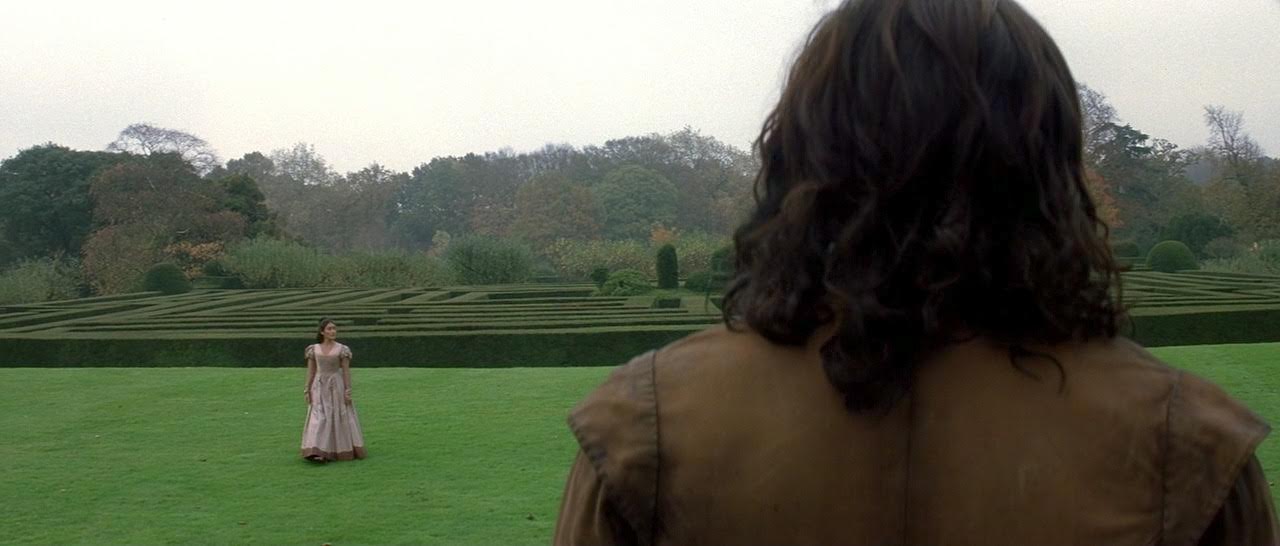Michael Cusumano here, kicking off our intermittent 2005 coverage for the next few weeks. This episode of The New Classics can be subtitled "Confessions of a Former Malick Agnostic."

Scene: Reunion in England
For most of my life, Terrence Malick films have been like going to church in that I respect the showmanship while being privately unmoved as, all around me, believers are moved to heights of ecstasy. Like any good lapsed Catholic, I felt tremendously guilty about this. If only I wasn’t so spiritually deficient, so hung up on traditional plot structure, then I wouldn’t be a Philistine who preferred Private Ryan to Thin Red Line (twenty lashes for being basic). True, I adored Badlands but that only increased my shame. Of course I would go for his most accessible one. What, is "Creep" my favorite Radiohead song, too?
My first viewing of The New World followed the usual script...

I was gobsmacked by Malick’s recreation of the Jamestown Colony, but I still noticed a gap between the respect I felt and the transcendence for which the film’s ethereal rhythms were clearly aiming. But then a funny thing happened. The New World never fully left my thoughts. My mind kept wandering back to it, especially its last movement where Pocahontas (Q’orianka Kilcher) is reunited with John Smith (Colin Farrel) in England. There was something about the way Malick made a manicured English garden feel like an alien planet that haunted me.
I can’t think of any film that better evokes the experience of viewing the familiar world through fresh eyes. What must it be like to see a horse for the first time? Or a carriage? The neatly sculpted shrubbery Pocahontas encounters is the perfect symbol for the vast gulf between the two worlds. Why would a bush have a right angle? Who would think to do that to a plant? I had struggled with Malick’s indulgences - the repetitive cutaways to nature, the endless twirling in magic hour glow - but would I be able to view England so completely from Pocahontas’s perspective without taking Malick’s journey to get there? I don’t think so.


Malick’s telling of this myth hews closer to history than most. John Smith abandons Pocahontas despite their spiritual connection, and, in what he believed to be a kindness, sends along word of his death in his wake. After being presented as a novelty at the court of King James, Pocahontas learns Smith lives, and her English husband John Rolfe (Christian Bale) arranges a meeting for the two. The change in the relationship’s temperature is reflected in the austere geometry of the garden setting. Emmanuel Lubezki’s camera which had carried them along on the breeze when they frolicked back across the Atlantic now poses them as carefully as an oil painting.
If their relationship symbolically represented the best-case scenario for their two peoples’ coexistence, we are witnessing the dying gasps of those hopes on this English estate. The communion the two shared on her home soil has long since dissipated. Smith seems smaller here, stripped of mythic stature, contrite, dwarfed by the architecture. Pocahontas remains a regal presence, but the sight of her dressed in the clothes of a proper English lady is a jarring one, an ill omen of the English desire to mold this new land in their image. Thematically it’s fitting that Pocahontas’s uncle is seen wandering the vast estate at the same time, at last comprehending the full, terrible scope of what colonization means for his people.

(The film avoids the troubling aspects of Smith and Pocahontas’s “romance”, portraying it more as a mutual fascination than anything libido-driven. For all it’s historical realism, The New World is still dealing in myth)
This latest viewing has confirmed what I suspected: I experienced a Malick conversion back in 2005 and it took me a decade and a half to realize. Even Malick’s trademark hushed narration works for me this time. What better way to express characters isolated by language and ostracized by their own people than to retreat into their inner monologues? It helps that I abandoned my futile efforts to extract meaning from the words as they whisked by, like Lucy in the chocolate factory trying to keep pace with the conveyor belt.


I’m almost afraid to re-watch Tree of Life now. Will the sight of Sean Penn staggering on a beach I once found so tedious now cause me to burst into sobs? Even if it doesn’t, that’s fine. I’ll keep returning to Malick’s films, searching for the sublime. After all, movie theaters are the closest thing to church I have in my life. So I’m okay with acting as if I have faith in the hopes that faith will be given to me.

Follow Michael on Twitter and Letterboxd. More episodes of The New Classics.